七下 Unit 11 How was your school trip? 单元知识点复习课件(共38张PPT)
文档属性
| 名称 | 七下 Unit 11 How was your school trip? 单元知识点复习课件(共38张PPT) | 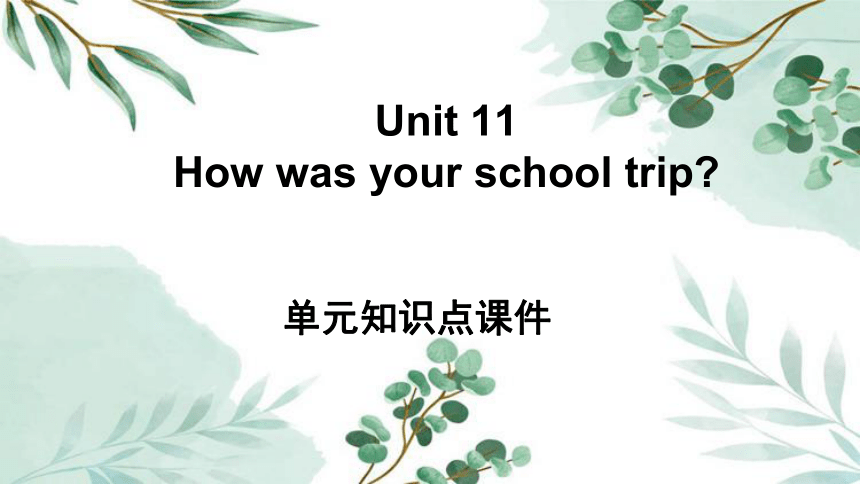 | |
| 格式 | pptx | ||
| 文件大小 | 706.2KB | ||
| 资源类型 | 教案 | ||
| 版本资源 | 人教新目标(Go for it)版 | ||
| 科目 | 英语 | ||
| 更新时间 | 2023-06-05 12:06:34 | ||
图片预览

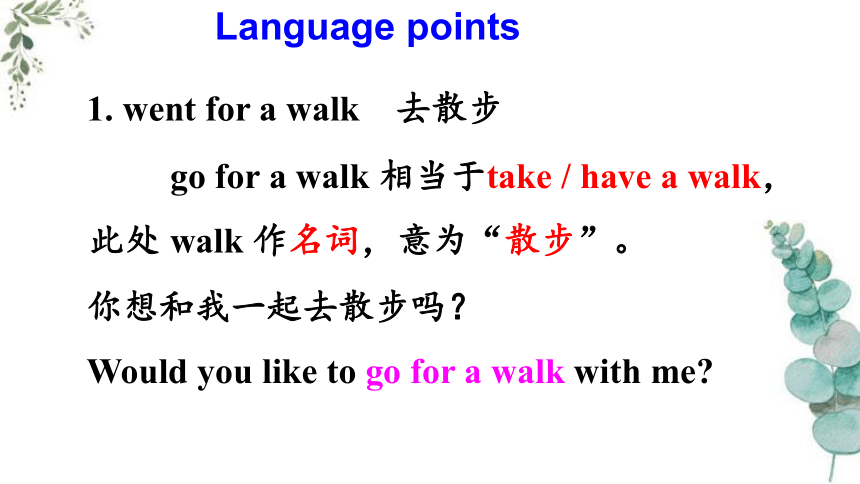
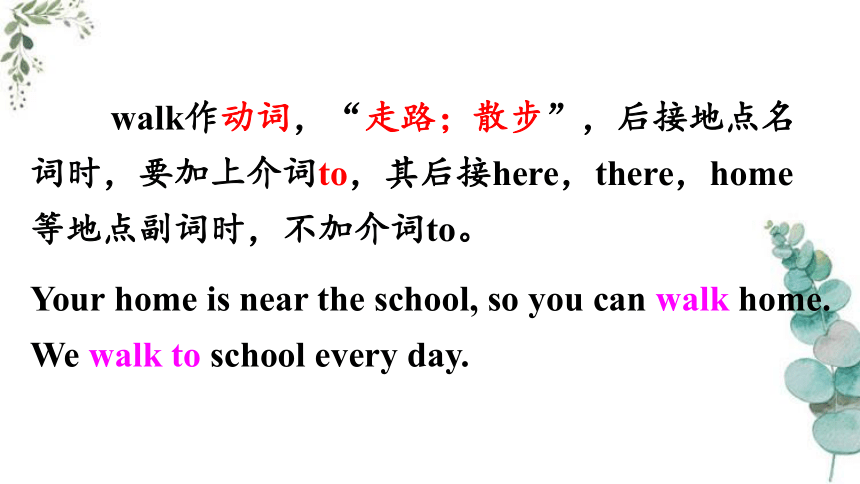
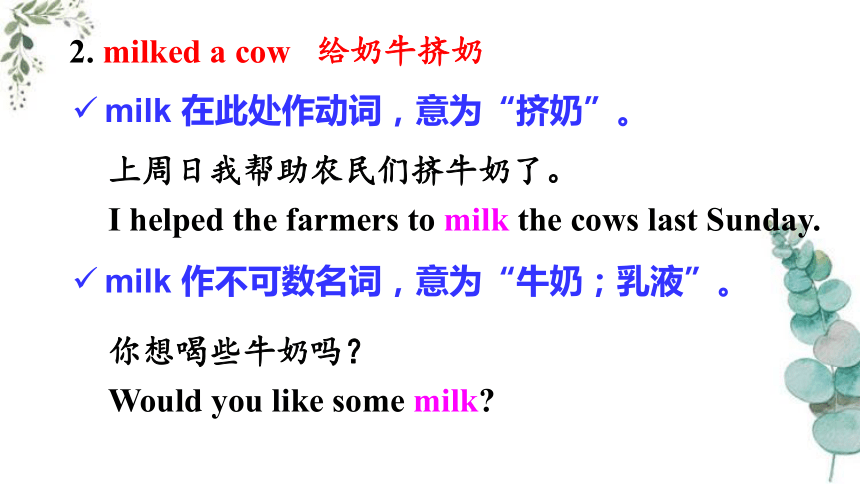
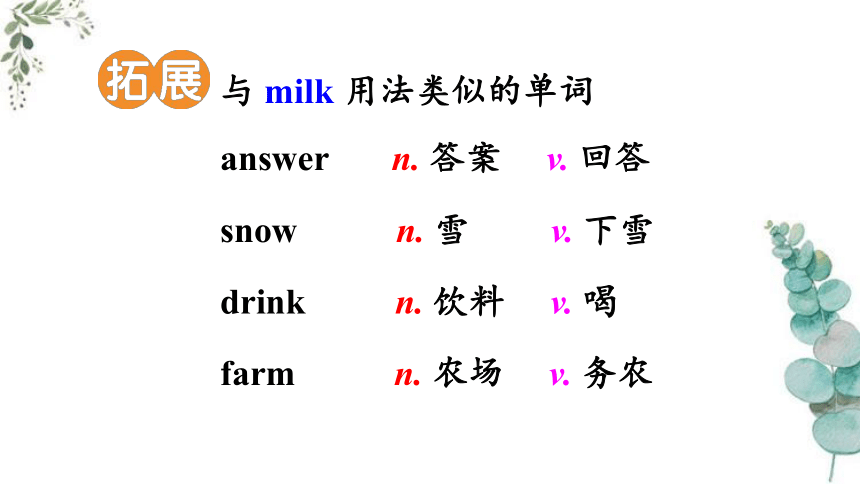
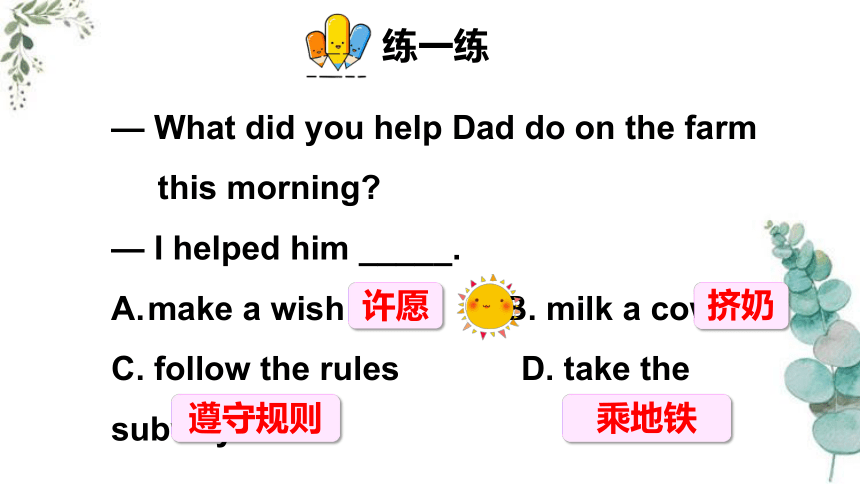
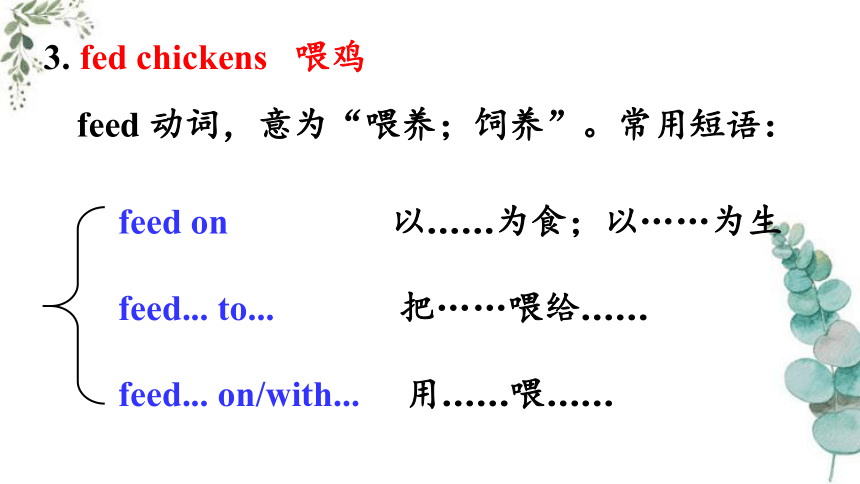
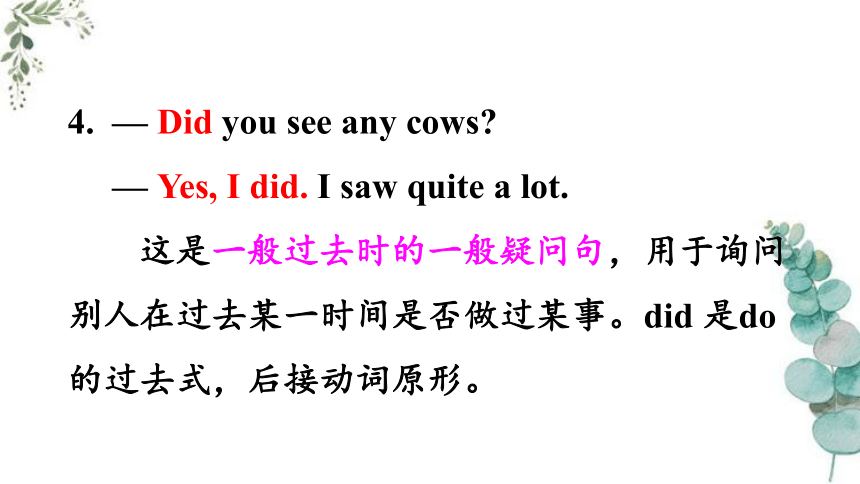
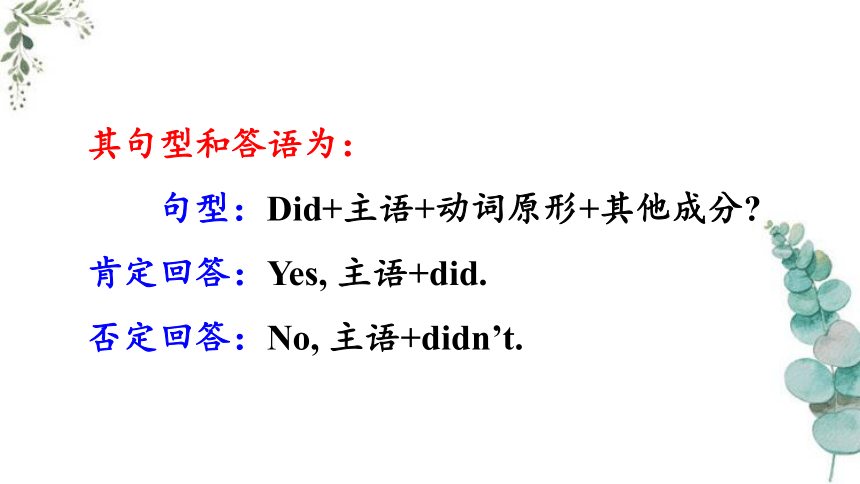
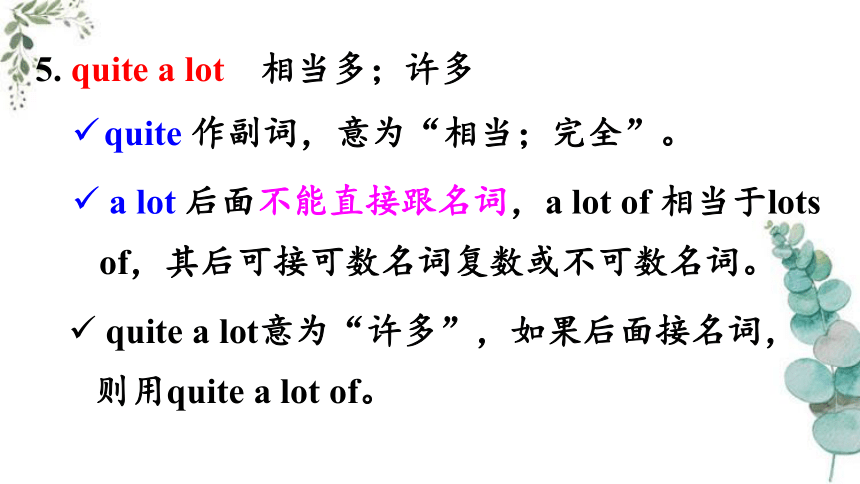
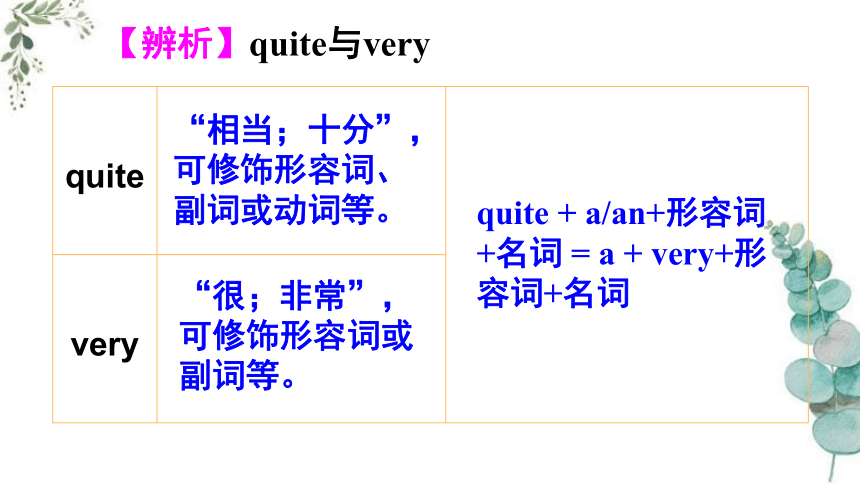
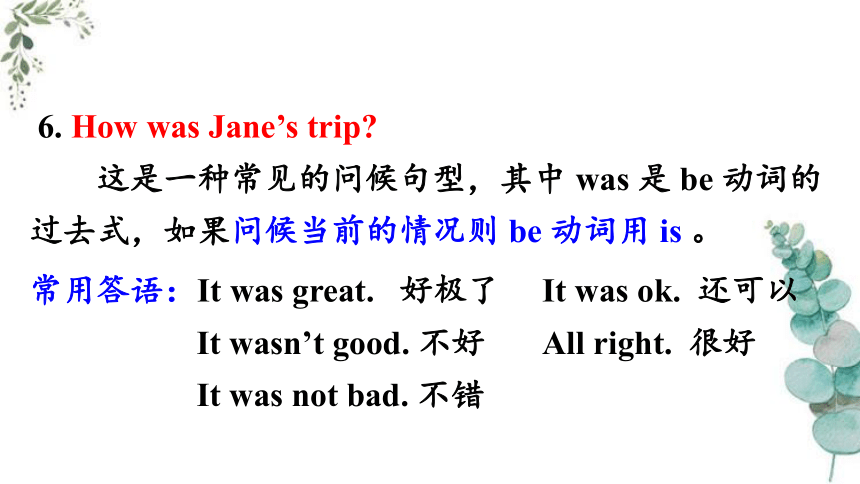
文档简介
(共38张PPT)
Unit 11
How was your school trip
单元知识点课件
Language points
1. went for a walk 去散步
go for a walk 相当于take / have a walk,此处 walk 作名词,意为“散步”。
你想和我一起去散步吗?
Would you like to go for a walk with me
walk作动词,“走路;散步”,后接地点名词时,要加上介词to,其后接here,there,home等地点副词时,不加介词to。
Your home is near the school, so you can walk home.
We walk to school every day.
2. milked a cow 给奶牛挤奶
上周日我帮助农民们挤牛奶了。
I helped the farmers to milk the cows last Sunday.
你想喝些牛奶吗?
Would you like some milk
milk 作不可数名词,意为“牛奶;乳液”。
milk 在此处作动词,意为“挤奶”。
与 milk 用法类似的单词
answer n. 答案 v. 回答
snow n. 雪 v. 下雪
drink n. 饮料 v. 喝
farm n. 农场 v. 务农
练一练
— What did you help Dad do on the farm
this morning
— I helped him _____.
make a wish B. milk a cow
C. follow the rules D. take the subway
许愿
挤奶
遵守规则
乘地铁
3. fed chickens 喂鸡
feed 动词,意为“喂养;饲养”。常用短语:
feed on 以……为食;以……为生
feed... to... 把……喂给……
feed... on/with... 用……喂……
4. — Did you see any cows
— Yes, I did. I saw quite a lot.
这是一般过去时的一般疑问句,用于询问别人在过去某一时间是否做过某事。did 是do的过去式,后接动词原形。
其句型和答语为:
句型:Did+主语+动词原形+其他成分
肯定回答:Yes, 主语+did.
否定回答:No, 主语+didn’t.
5. quite a lot 相当多;许多
quite 作副词,意为“相当;完全”。
a lot 后面不能直接跟名词,a lot of 相当于lots
of,其后可接可数名词复数或不可数名词。
quite a lot意为“许多”,如果后面接名词,
则用quite a lot of。
【辨析】quite与very
quite
very “相当;十分”,可修饰形容词、副词或动词等。
“很;非常”,可修饰形容词或副词等。
quite + a/an+形容词+名词 = a + very+形容词+名词
6. How was Jane’s trip
这是一种常见的问候句型,其中 was 是 be 动词的过去式,如果问候当前的情况则 be 动词用 is 。
常用答语:It was great. 好极了 It was ok. 还可以
It wasn’t good. 不好 All right. 很好
It was not bad. 不错
7. visit a fire station 参观消防站
fire 作不可数名词时,意为“火”;作可数名词
时,意为“火灾;炉火;灶火”。
常见短语:be on fire着火 put out a fire灭火
fire station消防站 make a fire生火
那座高楼着火了。 The tall building is on fire.
这附近有一个消防站。There is a fire station near here.
他们最终把火扑灭了。They finally put out the fire.
让我先生火吧。 Let me make a fire first.
例句:
8. saw some paintings
painting 意为“油画;绘画”。
paint 作动词时,意为“绘画;给……上油漆”。
painter 名词,意为“画家;油漆工”。
— Peter’s uncle is good at drawing pictures, right
— Yeah! All his _____ look very beautiful.
A. shops B. glasses C. dresses D. paintings
练一练
9. Today I went on a school trip.
go on a trip 意为“去旅行”,相当于have a trip。
go on a trip to… 意为“到……去旅行”。
例句:上周我们进行了一次学校旅行。
We went on a school trip last week.
练一练
Last week we went on ______ school trip but _______ trip was terrible.
A. a; / B. a; the
C. the; a D. the; /
10. Then the guide taught us how to make a model
robot.
guide名词,意为“导游;向导”,为可数名词。
guide作动词时,意为“指引;给某人领路”。
串记:这位导游将指引游客去宾馆。
The guide will guide the visitors to a hotel.
练一练
— Who can show you around Beijing
— My friend Alan. He is a great _________ .
A. villager B. farmer
C. guide D. doctor
how to make:特殊疑问词+不定式,意为“怎么……”,在句中作宾语。类似动词还有tell, show, teach, know等。
我不知道下一步做什么。
I don’t know ____________ next.
我不知道怎样拼写这个单词。
I don’t know ____________ the word.
what to do
how to spell
特殊疑问词+不定式结构可改写成由该疑问词引导的宾语从句,改写时在疑问词后加主语(与主句主语一致),将不定式改成“should+动词原形”作谓语。
You have to consider what to do next. =You have to consider what you should do next.
练一练
Now my grandma is teaching my brother how __________ model planes.
A. making B. to make
C. make D. makes
11. Then the guide taught us how to make a model robot.
taught 是动词 teach 的过去式,意为“教”,后面常接双宾语,即:teach sb. sth. = teach sth. to sb.
例句:他教学生英语。
He teaches English to the students.
=He teaches students English.
教某人做某事
12. All in all, it was an exciting day.
① all in all 总的来说;总之;整体上说
常用于句首,用来对所阐述的内容进行概括性总结及归纳。
例句:总的来说,你表现不错。
All in all, you do well.
含义 句子位置/适用句型
all in all
in all
at all
all in all, in all 与 at all
总的来说
总共,合计
根本
常用于句首
句首或句末
常用于否定句中
not (…) at all 根本不
总的来说,她是一位优秀的老师。 _________, she is an excellent teacher.
他们总共筹集了一万元。
They raised 10,000 yuan _______.
他根本不懂汉语。
He doesn’t know Chinese ______.
牛刀小试
All in all
at all
in all
② exciting意为“令人兴奋的,令人激动的”。常
用来修饰物,指某事使人兴奋、激动。
例句:那是本令人激动的书。
That is an exciting book.
辨析: exciting 与 excited
exciting
excited
令人兴奋的;
令人激动的。
修饰物;作
定语或表语。
感到兴奋的;
感到激动的。修饰人;作表语。
我看了一场令人兴奋的足球赛。
I watched an exciting football game.
听到这个好消息,我们都很兴奋。We were all excited after hearing the great news.
练一练
I’m ________ about the ________ football match.
A. exciting; excited B. excited; exciting
C. excited; excited
13. I think today’s school trip was terrible.
本句为含有宾语从句的主从复合句。主句为一般现在时态,宾语从句根据具体情况选用所需时态。宾语从句要保持陈述语序。
例句:我认为数学很难。
I think math is hard.
14. I couldn’t really see or hear the guide.
hear动词,意为“听到;听见”。
① hear sb. do sth. “听见某人做了某事或经常
做某事”,强调听见整个事情、行为的全过程。
我经常听见她弹钢琴。
I often hear her play the piano.
② hear sb. doing sth. “听见某人正在做某事”,
强调听见的动作正在进行。
我听见他们正在教室里唱歌。
I heard them singing in the classroom.
练一练
— Listen! Who is singing in the next room
— It must be Sally. I often hear her ________ there.
A. singing B. sings
C. to sing D. sing
15. I didn’t like the trip at all.
not at all意为“根本不……,完全不”,at all 放在句尾用于加强否定语气。
她根本不喜欢它。
She doesn’t like it at all.
拓展not at all单独使用时的用法:
① 可作为当别人表示感谢的应答语,意为“不
客气;不用谢”。
— Thank you very much.
— Not at all.
② 可作为别人称赞或带感谢性质的客套语,意
为“别客气”。
— It’s very kind of you.
— Not at all.
③ 可作为别人致歉时的应答语,意为“没关系”。
— I’m sorry, I’m late again.
— Not at all.
练一练
— It’s a little cold. Would you mind closing the
window
— ___________. I will do it right away.
A. Forget it B. No, you can’t
C. Not at all D. Of course
Unit 11
How was your school trip
单元知识点课件
Language points
1. went for a walk 去散步
go for a walk 相当于take / have a walk,此处 walk 作名词,意为“散步”。
你想和我一起去散步吗?
Would you like to go for a walk with me
walk作动词,“走路;散步”,后接地点名词时,要加上介词to,其后接here,there,home等地点副词时,不加介词to。
Your home is near the school, so you can walk home.
We walk to school every day.
2. milked a cow 给奶牛挤奶
上周日我帮助农民们挤牛奶了。
I helped the farmers to milk the cows last Sunday.
你想喝些牛奶吗?
Would you like some milk
milk 作不可数名词,意为“牛奶;乳液”。
milk 在此处作动词,意为“挤奶”。
与 milk 用法类似的单词
answer n. 答案 v. 回答
snow n. 雪 v. 下雪
drink n. 饮料 v. 喝
farm n. 农场 v. 务农
练一练
— What did you help Dad do on the farm
this morning
— I helped him _____.
make a wish B. milk a cow
C. follow the rules D. take the subway
许愿
挤奶
遵守规则
乘地铁
3. fed chickens 喂鸡
feed 动词,意为“喂养;饲养”。常用短语:
feed on 以……为食;以……为生
feed... to... 把……喂给……
feed... on/with... 用……喂……
4. — Did you see any cows
— Yes, I did. I saw quite a lot.
这是一般过去时的一般疑问句,用于询问别人在过去某一时间是否做过某事。did 是do的过去式,后接动词原形。
其句型和答语为:
句型:Did+主语+动词原形+其他成分
肯定回答:Yes, 主语+did.
否定回答:No, 主语+didn’t.
5. quite a lot 相当多;许多
quite 作副词,意为“相当;完全”。
a lot 后面不能直接跟名词,a lot of 相当于lots
of,其后可接可数名词复数或不可数名词。
quite a lot意为“许多”,如果后面接名词,
则用quite a lot of。
【辨析】quite与very
quite
very “相当;十分”,可修饰形容词、副词或动词等。
“很;非常”,可修饰形容词或副词等。
quite + a/an+形容词+名词 = a + very+形容词+名词
6. How was Jane’s trip
这是一种常见的问候句型,其中 was 是 be 动词的过去式,如果问候当前的情况则 be 动词用 is 。
常用答语:It was great. 好极了 It was ok. 还可以
It wasn’t good. 不好 All right. 很好
It was not bad. 不错
7. visit a fire station 参观消防站
fire 作不可数名词时,意为“火”;作可数名词
时,意为“火灾;炉火;灶火”。
常见短语:be on fire着火 put out a fire灭火
fire station消防站 make a fire生火
那座高楼着火了。 The tall building is on fire.
这附近有一个消防站。There is a fire station near here.
他们最终把火扑灭了。They finally put out the fire.
让我先生火吧。 Let me make a fire first.
例句:
8. saw some paintings
painting 意为“油画;绘画”。
paint 作动词时,意为“绘画;给……上油漆”。
painter 名词,意为“画家;油漆工”。
— Peter’s uncle is good at drawing pictures, right
— Yeah! All his _____ look very beautiful.
A. shops B. glasses C. dresses D. paintings
练一练
9. Today I went on a school trip.
go on a trip 意为“去旅行”,相当于have a trip。
go on a trip to… 意为“到……去旅行”。
例句:上周我们进行了一次学校旅行。
We went on a school trip last week.
练一练
Last week we went on ______ school trip but _______ trip was terrible.
A. a; / B. a; the
C. the; a D. the; /
10. Then the guide taught us how to make a model
robot.
guide名词,意为“导游;向导”,为可数名词。
guide作动词时,意为“指引;给某人领路”。
串记:这位导游将指引游客去宾馆。
The guide will guide the visitors to a hotel.
练一练
— Who can show you around Beijing
— My friend Alan. He is a great _________ .
A. villager B. farmer
C. guide D. doctor
how to make:特殊疑问词+不定式,意为“怎么……”,在句中作宾语。类似动词还有tell, show, teach, know等。
我不知道下一步做什么。
I don’t know ____________ next.
我不知道怎样拼写这个单词。
I don’t know ____________ the word.
what to do
how to spell
特殊疑问词+不定式结构可改写成由该疑问词引导的宾语从句,改写时在疑问词后加主语(与主句主语一致),将不定式改成“should+动词原形”作谓语。
You have to consider what to do next. =You have to consider what you should do next.
练一练
Now my grandma is teaching my brother how __________ model planes.
A. making B. to make
C. make D. makes
11. Then the guide taught us how to make a model robot.
taught 是动词 teach 的过去式,意为“教”,后面常接双宾语,即:teach sb. sth. = teach sth. to sb.
例句:他教学生英语。
He teaches English to the students.
=He teaches students English.
教某人做某事
12. All in all, it was an exciting day.
① all in all 总的来说;总之;整体上说
常用于句首,用来对所阐述的内容进行概括性总结及归纳。
例句:总的来说,你表现不错。
All in all, you do well.
含义 句子位置/适用句型
all in all
in all
at all
all in all, in all 与 at all
总的来说
总共,合计
根本
常用于句首
句首或句末
常用于否定句中
not (…) at all 根本不
总的来说,她是一位优秀的老师。 _________, she is an excellent teacher.
他们总共筹集了一万元。
They raised 10,000 yuan _______.
他根本不懂汉语。
He doesn’t know Chinese ______.
牛刀小试
All in all
at all
in all
② exciting意为“令人兴奋的,令人激动的”。常
用来修饰物,指某事使人兴奋、激动。
例句:那是本令人激动的书。
That is an exciting book.
辨析: exciting 与 excited
exciting
excited
令人兴奋的;
令人激动的。
修饰物;作
定语或表语。
感到兴奋的;
感到激动的。修饰人;作表语。
我看了一场令人兴奋的足球赛。
I watched an exciting football game.
听到这个好消息,我们都很兴奋。We were all excited after hearing the great news.
练一练
I’m ________ about the ________ football match.
A. exciting; excited B. excited; exciting
C. excited; excited
13. I think today’s school trip was terrible.
本句为含有宾语从句的主从复合句。主句为一般现在时态,宾语从句根据具体情况选用所需时态。宾语从句要保持陈述语序。
例句:我认为数学很难。
I think math is hard.
14. I couldn’t really see or hear the guide.
hear动词,意为“听到;听见”。
① hear sb. do sth. “听见某人做了某事或经常
做某事”,强调听见整个事情、行为的全过程。
我经常听见她弹钢琴。
I often hear her play the piano.
② hear sb. doing sth. “听见某人正在做某事”,
强调听见的动作正在进行。
我听见他们正在教室里唱歌。
I heard them singing in the classroom.
练一练
— Listen! Who is singing in the next room
— It must be Sally. I often hear her ________ there.
A. singing B. sings
C. to sing D. sing
15. I didn’t like the trip at all.
not at all意为“根本不……,完全不”,at all 放在句尾用于加强否定语气。
她根本不喜欢它。
She doesn’t like it at all.
拓展not at all单独使用时的用法:
① 可作为当别人表示感谢的应答语,意为“不
客气;不用谢”。
— Thank you very much.
— Not at all.
② 可作为别人称赞或带感谢性质的客套语,意
为“别客气”。
— It’s very kind of you.
— Not at all.
③ 可作为别人致歉时的应答语,意为“没关系”。
— I’m sorry, I’m late again.
— Not at all.
练一练
— It’s a little cold. Would you mind closing the
window
— ___________. I will do it right away.
A. Forget it B. No, you can’t
C. Not at all D. Of course
同课章节目录
- Unit 1 Can you play the guitar?
- Section A
- Section B
- Unit 2 What time do you go to school?
- Section A
- Section B
- Unit 3 How do you get to school?
- Section A
- Section B
- Unit 4 Don't eat in class.
- Section A
- Section B
- Unit 5 Why do you like pandas?
- Section A
- Section B
- Unit 6 I'm watching TV.
- Section A
- Section B
- Review of Units 1-6
- Unit 7 It's raining!
- Section A
- Section B
- Unit 8 Is there a post office near here?
- Section A
- Section B
- Unit 9 What does he look like?
- Section A
- Section B
- Unit 10 I'd like some noodles.
- Section A
- Section B
- Unit 11 How was your school trip?
- Section A
- Section B
- Unit 12 What did you do last weekend?
- Section A
- Section B
